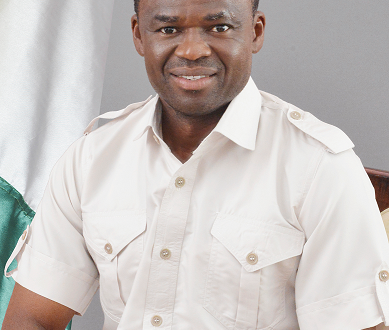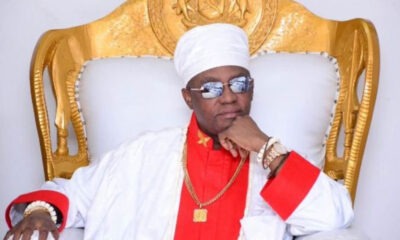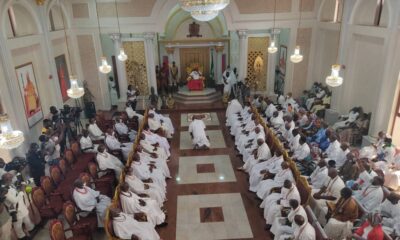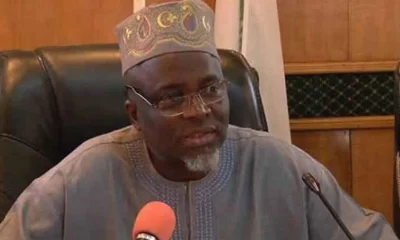Headline
‘I’ve Desired Things Done Properly; A Society Devoid Of Oppression’ – Rights Activist [INTERVIEW]
Published
3 years agoon
By
Editor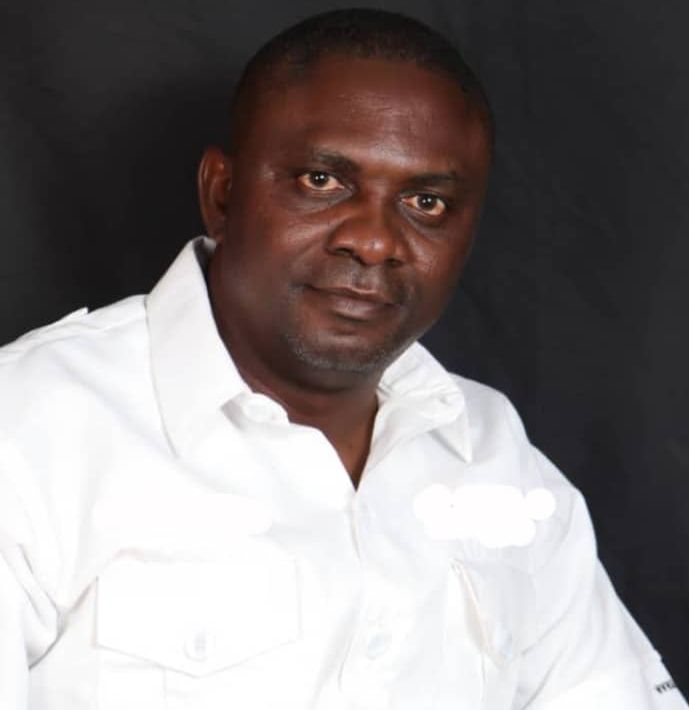
Comrade Osazee Edigin, is a former Public Relations Officer of Edo Civil Society Organizations (EDOCSO) and coordinator, Action for Social-Political and Economic Change which has an acronym as ASEC. He is a man who has seen so much when it comes to activism and fighting for the masses in Edo State and Nigeria at large. In this interview, hee speaks about his challenges, good times, and what led him into activism…
Excerpt
Tell Us About You?
I am Comrade Osazee Edigin, I am a civil rights activist and also a business man. I am the immediate past Public Relations Officer of Edo Civil Society Organizations, EDOCSO. I am also the coordinator of My civil society group, which is an affiliate of Edo civil society organisations. The name of my group is Action For Social-Political and Economic Change which has an acronym as ASEC.
How Long Have You Been Into Activism?
Well, I can take you through memory lane. It is as far back as 80’s, precisely, 1989. My first outing was during the Structural Adjustment Programme (SAP) Riot during the military head of state, Ibrahim Babagida.
I was still in secondary school then, when the SAP Riot broke out. I was still very young then. We have to join some of our elder brothers to be on the streets to be part of the riot. I was part of the procession to the House of Assembly through the GRA, and some notable politicians houses, then, to express our grievances and it is not like now that we have protest, then it was riot where you see burn fires, government property are destroyed just to express your grievances.
In that riot, an uncle of mine was arrested while some of us ran and he was taken to Maduguri in a military cargo plane for trial. I could remember very well, and on till six months before he resurfaced.
I also partook during the Abacha maladministration wherein there was fuel scarcity. There was poverty in the land, and he wanted to continue as a civilian president and there were riots.
These were some of the things that spurred my anger against so many things that were not going well in the country. Then, the death of Ken Saro Wiwa was another one that I also partook in and since then, it has been one struggle to the other.
We are now in Edo State where there is civilian government and I have been part of different struggles. Outside that, I became the Public Relations Officer of Edo Civil Society Organizations, (EDOCSO) which was a coalition. Some of us were the brains behind it.
What Led You Into Activism?
Like I said earlier, looking at things that are not going well in the society – I hate oppression. I have always desired things to be done appropriately. I have always wanted a society where people can live freely, a society devoid of oppression, a society where we have a responsive government.
Some of these things have been some of my worries and of course, I can’t do that by hiding. I saw the need to take action. Now, right from the time of the SAP Riot which I mentioned in 1989, it has been from one thing to the other. So, those were the training days as a very young man then and looking at the society, I think that we need a change. We need to live like the way other ideal society live not retrogressively. So, some of these things motivated me to say it is good to speak up. And when you talk about activism, it has to do with citizens who have the ability to speak up. So, there is nothing spectacular about it. Your ability not to hide in the face of challenges, that is what makes you an activist.
What Are Your Trying Moment?
My most trying moment has been most times, when you look at some of these things, and when people see you as one who speaks truth to power, they tend to avoid you, they also try not to bring you into certain things mostly on the part of government even within your family cycle too. There are certain things they want to discuss and they know you will not take it likely, they will not bring you in.
There are instances where we have been arrested; where we tend to stand for somebody, so, the authority took us into custody for standing for somebody that doesn’t have a voice.
At a time, the Trade Union Congress of Ghana invited us to Ghana sometimes in 2015 or 16 if I am not mistaken, when we went to join in a well mobilised protest against the hardships in Ghana, we were arrested and we spent days in their custody but we thanked God some of our comrades in Nigeria, their agitations, the support we got from people in Nigeria here, actually made the Ghanian government to know that they cannot just take us into custody because from what we gathered, we did not commit any criminal offence.
As a member of ECOWAS countries, we are also citizens in Ghana for the time being, as at the time we were in Ghana at least, we had up to three months to be seen as citizens of Ghana because Ghana also belongs to the ECOWAS Community. The experience has been that people seem to just sideline you in so many things that they think you will speak against and these are the things that don’t make the society move forward. How do you marry your activism with your personal affairs? Well, some of us have taken activism as a way of life but again, we also know that we have another life which has to do with our families, our businesses, so, we try to schedule our time, our resources as it were, being that we are not in activism because we want to be politically relevant. We are in activism because we want to contribute our quota to the society and in doing that, you must also know that you have a life to live outside activism, you must have time for your family, take care of your family’s need. As an activist, it doesn’t stop me from working; it doesn’t stop you from doing business. So, you must be able to arrange your time adequately so that everything will flow accordingly without you having much challenges. Though, it is not easy, most times, when your wife hears that you are going out for a protest or you are in one police station or the other, she gets agitated.
There is this fear that we live in a society where people can be very wicked and if you are speaking truth to power, there is this fear that you can be harmed by the system we belong to. The fear is there, but what we do most times is to see how we can assuage these fears, encourage them that nothing will happen but it has not been easy, anyway.
Why Did You People Choose To Wade Into The Issue Of The N750 BEDC Fixed Charge?
Well, as an activist, you look at areas the masses are suffering, you look at those people who can’t help out, yes, not necessarily that you are part of such suffering but because you hold those people that don’t have the voice to speak in high esteem, so you have to put yourself in their place in fighting for them. As an activist, you just begin to think, why are things not in the way they used to be? We sat down and x-ray Nigeria, why are people suffering? Why is there hunger? And part of the things we realized is that, the lack of electricity was part of it. Lack of electricity has actually reduced productivity, it has reduced entrepreneurship and in a society where you don’t have such, it means that the people are going to be poor. If people are poor, it means crime rate is going to increase. So, there are a whole lot of chain connection to all these.Now, we realized that one of the reasons we don’t have electricity in Nigeria is because Nigerians have been shortchange because of this N750 which they called fixed charge. A lot of people know it as Metre Maintenance Fee, but the actual name is fixed charge, whether you consume electricity or not, you are asked to pay a minimum of N750 for residential buildings, for industrial buildings, it ranges from N50,000 to N250,000 that people pay every month. I said no, we need to interrogate this N750, it is unfair. It is not justifiable for somebody to collect what he has not worked for. That was part of things that motivated us to begin to ask questions and when we saw we could not get convincing response from the power company, we have no choice than to begin to take steps in stopping the fixed charge which also took us to a Lagos High Court where it was ruled that it was illegal and other steps we took before the Federal Government in 2016, I think, in February 1st, it was now abolished. We saw it as a disservice to Nigerians that private entities, they have been so empowered to be taking from Nigerians for services not rendered. So, it was appalling and we needed to fight it. So, we went out with our strength, our resources and all that we got to ensure that it was abolished and indeed, we did succeed in 2016 and till date, it has been abolished.
How Did You People React To The Support Given To EDOCSO By The National Assembly?
We felt very important to the development of Nigeria when the national assembly also made efforts sometimes ago to criminalise estimated billings and every other charges that will not make Nigeria move forward.
When we paid our visit to the national assembly by meeting our various Reps and Senators, Senator Uzamere, from Edo South, presented our petition before the floor of the house and it was like an eye opener even to the lawmakers. It now occur to us that even the laws that are being made by our lawmakers, they are not even abreast with the provisions of these laws. So, we were able to bring out those areas that gave the players in the sector to extort Nigerians and that made their eyes to be opened to see that this thing has been going on for quite some time. So, we were happy that for a very first time, we were able to open our lawmakers’ eyes to see a sector that has been extorting, exploiting Nigerians. So, it was a great time to express the need for government and civil society to collaborate for the advancement of the society.
For most times, people see civil society as trouble makers; people who just want to criticize or do not have anything to bring to the table, but that is not correct. We were able to prove a point during that engagement.
Do You Have Intention Of Putting Up All Your Experiences Into A Compendium?
Yes, I thought about this because we have actually engaged in so many activities, so many of them are not even documented and why it is so is that, we did so many of these things so selflessly and on that, we did not see the need to document so many of them, but a lot have also been documented.
So, in the nearest future, it is my greatest desire to put some of these things together in a small essay that people can actually refer to. But what we have also noticed is that, our actions over the years, have inspired a lot of young activists too who can now stand and demand for their rights.
Now, you have seen so many groups coming up with different names, demanding for one right and/or the other. You could remember recently, there was a group who came up to fight this land grabbing of a thing.
These are some of the inspirations gotten from what some of us have been able to do over the years. They saw the passion, the enthusiasm we exhibited in ensuring that the right things are done. So, I plan to put some of these things together in a book that the future generations can refer to and such should be able to spur them on how activism should be carried out. Whether we like it or not, some of us have been able to redefine activism which has also affected how government behaves. So, these are some of the things that we have been able to do and before anybody goes out to do things, he thinks what will the right groups do if I go this way and if we did not document some of these things, it will be something that we did not do well in our generation. The newspapers reports that we have been able to assemble as it were, owing to our duty, over 300 as I speak with you. It is over 300 that we have kept in our archives. So, there is a whole lot of information that we can put together for the next generation to see how the nation was able to fair in our own time.
How Will You Rate Activism In Nigeria?
Well, I can say, there are different levels of activisms. There are some who are in activism because they want to get political relevance. There are some who think activism is an opportunity to get what to eat.
There are also some who are genuinely fighting the course of the common man without expecting any gratification, but you can’t compare activism of today to where we are coming from because politics has been able to eat so deep into so many of our people. That is so because there is no job for a lot of our youths and most times, when you see them raising their voices, it is because they want to be noticed, because they want to be given relevance, but in our time, it was not like that, it was selfless and a lot of people saw that selfless attributes in us even when we have so many temptations of being compromised, but we never gave in, we were resolute in whatever struggle we decided to engage in. So, politics is actually destroying activism and those that can stay on, they will always distinguish themselves.
Are You Quitting Activism?
No, there is no programme entry time and exit time, an activist is an activist. That you hold an positions does not make you superior to every other activists that all of you are in the same group.
What we have done over the years is to institutionalise activism in Edo State. I will break it down, when we came up as an individual, the fuel subsidy in January 2012, when the protest broke out in Nigeria during the administration of President Goodluck Jonathan, so many of us were operating at individual capacity then, handling our different groups, so we came together to prosecute that protest. That was where we began to mute the idea of having a coalition which later metamorphose into the Edo Civil Society Organizations. Edo Civil Society Organisations is coalition of civil society groups and individuals in Edo State and from there, we now moved to having study centres, where we create community based classes where we teach locales about their rights and the society, we build their consciousness and why we are doing that is to make sure that the civil society movement is institutionalised and as at the last count, we have 22 of those classes in different communities across Edo State. We have in Edo Central, South and Edo North and we are building more. So, persons have come into the movement, they have been trained, they have been conscientized, they have the passion to take off from where some of us have taken them to and that doesn’t stop the fact that, I still remain as an activist. At this moment, I still response to issues as an activist that I am, but as part of the persons that have built the institution of activism in Edo State, I remain one of the persons who also give my advice, my experiences to the younger ones on how to go about activism. It is not that I am quitting activism, it is just that I tend to dedicate more of my time to my private business now to activism but activism is in my DNA. So, any day they may call, it is an act, I am out there to defend the helpless irrespective of whose horse is gorged.
Is There Any Time You Were Offered Money To Jettison An Idea?
That is a common phenomenon in activism but we tend not to mention some of those things because we see these as some of those things that will come. We live in a corrupt society. We live in a society people think with money, they can buy your conscience. It is not an easy thing to always stand against a society that has been programmed with corrupt practices because what we do as activists is to raise issues, issues that will better the life of the masses, but a lot of people in Nigeria who have attained leadership do not actually want the betterment of Nigerians, they want the suffering and they are self-centred. So, when an activist speaks up, it is either they want to give you a preferential treatment or they think they want to buy you over. Yes, I have been to offices where processes have been circumvented and when I appear, raise my voice, they want to give me preferential treatment, I tell them no. I want everyone to be treated the way I am being treated. These are things that we come across everyday. For instance, when we go to police station to go and take somebody on bail, maybe they are two or three suspects, police will say we are only giving you one, I will say no, we came for the three suspects and we are taking the three at no cost.
Talking about money, it is a normal thing in activism. But if you want to grow as an activist, you must be able to resist the temptations of being bought over, it is key, if you really want to succeed as an activist. Any activist that wants to go down so early, is the one that will go and be compromising his stands, he struggles.A lot of people who have come into activism have sold out their conscience. You can’t eat your cake and have it. You must either stand with the truth and remain resolute or you get yourself compromised and you get yourself out of the system.
What Would You Like To Be Remembered For?
I want to be remembered as someone who contributed his quota to a better society and who spoke at a time things were not done properly, as a voice who stood out and refused to go by the general direction of those that don’t want things to be done well in Nigeria. I want to be remembered as somebody who has the true passion for a better society. You see, we live in a country where people go for vain glory but to someone like me, everything about this world is vanity. What will make me happy is when someone that is oppressed is able to be delivered from the hands of the oppressors. These are the things that have given me joy and I am glad I have been able to do that all these years, I have touched so many lives, I have fought so many battles and God has kept me alive till now, it is something that has given me joy.
Have You Been Confronted With Threats To Life?
Severally, there are some, they will attack us physically with dangerous weapons many times but you can’t remove the fact that the truth will always stand. We see those attacks as part of the job.
You may like
Headline
How Two Kenyan School Dropouts Made Prosthetic Arms For People With Disabilities
Published
2 hours agoon
May 2, 2024By
Editor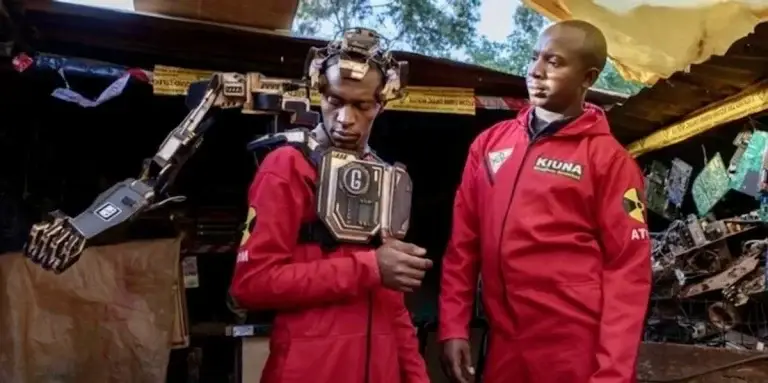
Two young Kenyan inventors have invented bio-robotic prosthetic arms from waste materials to help improve the lives of the physically challenged people in 2021.
Both David Gathu and Moses Kiuna were at the age of 29 when they designed a bio-robotic prosthetic arm in helping the people that have lost their limbs.
Recounting their ordeal before venturing into the invention, the duo said they were forced to drop out of college because of the expensive school fees but did not let the challenges steal their vision.
Gathu and Kiuna accomplished their dream to help their communities in a workshop in Kiambu county in Kikuyu, Kenya, north of the capital Nairobi.
READ ALSO: 14-year-old Boy Killed In London Sword Attack
According to Face to Face Africa, the workshop was basically a shed made out of worn-out rusted iron sheets standing next to a chicken coop.
The floor was covered with gravel, making the ground outside the shop and the interior all but indistinguishable, as brown broken glass with tape all around fits the window frame.
Brain signal bio-robotic arm
Another significant thing about the invention was being the world’s first bio-robotic arm operated by brain signals. The invention, which is controlled by brain signals, has been billed as a game-changer in the lives of disabled people in Kenya.
Gathu and Kinyua’s invention was unique and different from most prosthetic technology which is powered by a person’s muscles.
READ ALSO: Woman Reveals Secret To Longevity As She Celebrates 106th Birthday
The arm works by converting brain signals into an electric current by a “NeuroNode” biopotential headset receiver. NeuroNode biopotential was originally invented to help people suffering from paralysis and speech loss.
Also, the inventors narrated that the idea to develop an electronic prosthetic came to them during the pandemic as part of their contribution towards assisting Kenya to battle the pandemic. It was initially created to help COVID-19 sanitisation efforts.
“When the virus hit our country, we decided to create a machine that could help us decontaminate surfaces. It can also be used in schools, restaurants, hospitals,” Shoppe Black quotes Kinyua as saying.
Using waste products
According to a report by Anadolu Agency, the Kenyan inventors solved two problems with their innovations, first, by using waste products to make the environment clean and safe, and helping a community of people living with disabilities.
READ ALSO: Popular Iraqi TikToker Umm Fahad Gunned Down Outside Baghdad Home
“People throw away a lot of things that are harmful to the environment just because they don’t work. If they don’t work, it might be just one component that’s faulty but all the other components still work and can be recycled,” Gathu said.
“We’ve recycled everything that you see here. They throw it away, we pick it up and use it. This has saved us from spending a lot of money because we’re not backed up financially by anyone to come up with our innovations.”
They picked up “junk” that people threw away – things like plastic, rubber, wiring, old computer motherboards, LED lights, USB devices, switches, optical drives, heat sinks, fans, and power supply units – components that they say could be quite expensive to purchase from a shop.
Helping the community
READ ALSO: UK-based Nigerian Doctor Loses Licences Over Sex For Free Botox Injections
Speaking about the physically challenged people, he said, “The main reason we came up with this is to help people in our community who have lost their limbs. We don’t want these people to feel like they can’t do anything, we want them to be dependent on themselves.”
The arm can do many more tasks. They say they are still perfecting their device, but lack of funds has been a challenge.
David Mathenge from the Association for the Physically Disabled of Kenya (APDK), a charity NGO, says: “Such inventions are the future of the science of artificial limbs. This is the science we need to ease the challenges people with disabilities face.”
Headline
Obesity’: Father Forced 6-year-old To Run On Treadmill, Son Dies [VIDEO]
Published
15 hours agoon
May 2, 2024By
Editor
A disturbing video has emerged showing an accused “killer” father forcing his 6-year-old son to run on a treadmill because the child was “too fat”.
Christopher Gregor, 31, appeared in court Tuesday, April 30 to stand trial for allegedly murdering his son Corey Micciolo in 2021. He faces life in prison if convicted.
During the trial, the Superior Court in New Jersey was shown surveillance video of Gregor forcing Corey to run on a treadmill after the boy fell off multiple times due to the exercise machine’s excessive speed.
Gregor and his son were seen on March 20, 2021, entering the Atlantic Heights Clubhouse fitness center, where the boy was promptly placed on the treadmill and began running, according to a video, obtained by CourtTV.com.
READ ALSO: 14-year-old British-Nigerian’s Death Raises Renewed Concerns Over Knife Violence In London
Footage captured Gregor walking up to the treadmill to increase the speed and raise the incline of the track.
The sudden changes in speed and elevation were too much for the little boy’s legs, causing him to fall down and slide off the moving track.
Despite the son falling off, Gregor lifted and tossed him back onto the treadmill, which forced the child’s legs to fold backwards as the father seemingly clamped his teeth into Corey’s head.
The boy gets back on, but again falls off and continues to struggle to remain on the machine, eventually leading the father to decrease both the the speed and incline.
The boy’s mother, Bre Micciolo, was the first witness to take the stand and was in tears as she watched the horrific video.
READ ALSO: Super Eagles Stars, Calvin Bassey And Alex Iwobi Caught On Camera Shopping Together In London
Days before her son’s death, Bre Micciolo reported the boy’s injuries to the New Jersey Division of Child Protection and Permanency, according to the US Sun.
On April 1, she requested that Gregor take their son to see a doctor.
While at the appointment, Corey reportedly revealed his father made him run on the treadmill “because he was too fat,” the outlet reported.
The next day, Gregor rushed the young boy to the hospital because the boy woke up from a nap stumbling, slurring his words, and experiencing nausea and shortness of breath, according to Court TV.
During a CT scan, Corey suffered a seizure, forcing medical staff to take life-saving measures, but he died.
An initial autopsy found Corey died as a result of blunt force injuries with cardiac and liver contusions with acute inflammation and sepsis.
READ ALSO: Super Falcons Goalie, Nnadozie Wins Best Goalkeeper Award In France
Gregor was arrested in July 2021 on child neglect charges stemming from investigators reviewing the surveillance footage from the fitness center.
“Specifically by having (Corey) run on a treadmill and increasing the speed, causing (Corey) to fall, placing (him) back on the moving treadmill while appearing to bite his head, causing the said child to fall several more times,” an arrest warrant obtained by the outlet read.
In September 2021, a forensic pathologist determined Corey’s death to be a homicide as he suffered from chronic abuse including blunt impact injuries on his chest and abdomen with a laceration on his heart, left pulmonary contusion, and laceration and contusion of his liver.
Dr Thomas Andrew believes Corey suffered an acute traumatic injury to the heart four to 12 hours before his death, according to Court TV.
Gregor was arrested on March 9, 2022, for his son’s death but turned down a 30-year plea deal.
He is being held in the New Jersey Jail without bond.
NEW: Mother breaks down in court as she watches her son’s father abuse her child by making him run on the treadmill because he was “too fat.”
New Jersey father Christopher Gregor is accused of killing his 6-year-old son Corey Micciolo.
New footage shows the boy repeatedly face… pic.twitter.com/aVKknkOGd5
— Collin Rugg (@CollinRugg) May 1, 2024
Advertisement
Headline
14-year-old British-Nigerian’s Death Raises Renewed Concerns Over Knife Violence In London
Published
15 hours agoon
May 2, 2024By
Editor
The recent sword attack in Hainault, a suburban area in northeast London, has sparked renewed discussions about the ongoing issue of knife crime in the UK, particularly in the capital.
The young victim of the attack has been identified as Daniel Anjorin, a 14-year-old boy.
The Times reports that Anjorin, the son of a science teacher, went to school with Grace O’Malley-Kumar, the Nottingham knife-attack victim.
According to recent data from the Office for National Statistics, reported by Sky News, there has been a 7% rise in knife crime from December 2022 to December 2023. Over the past decade, there has been a significant 81% increase in this type of crime.
READ ALSO: Updated: 14-year-old British-Nigerian Boy Killed By Sword-wielding Man In London
Knife-related crime rates in London and the West Midlands are among the highest in England and Wales.
The number of knife-related crimes reported by the Met Police increased by 20% between 2022 and 2023, while in the West Midlands, there was an 8% rise.
In 2023, London saw a concerning 30% of knife-related crimes, amounting to 165 incidents per 100,000 people.
Meanwhile, the West Midlands recorded a slightly lower rate of 118 incidents per 100,000.
READ ALSO: LIST: Nigerian Passport Ranked Among Worst Globally
For both male and female victims, sharp objects such as kitchen knives, swords, and machetes accounted for two-fifths of all killings in the United Kingdom in the year ending in March 2023.
While the recent attack involved the use of a sword, statistics from the Home Office indicate that such incidents are relatively rare in cases of fatal stabbings.
Although the attacker employed a sword in yesterday’s incident, it contributed to only three fatalities involving sharp objects in 2023.
Faron Paul, leader of Faz Amnesty, an organisation facilitating the surrender of weapons by children to the police, expressed at the scene of the blockade that authorities are not sufficiently addressing the prevention of knife crime.
READ ALSO: [UPDATED] London Sword Attack: Suspect Under Police Custody After Hospital Recovery
Speaking with the BBC, he said, “It’s not rising. It’s gone through the roof. We’ve got a big problem here. Children are dying on the street every single day. You’ve got a problem. And I don’t feel like the right things are being put in place to prevent, deter or stop knife crime.”
He added that it wasn’t just the area but “the whole of London has a problem.”
“We need to have better consequences and laws in place. We need to stop buying and selling illegal weapons online. And then we need to think about preventative measures.”

JUST IN: Crisis In UniAbuja As ASUU Faction Declares Indefinite Strike

[JUST IN] PICTURES: Hoodlums Clash In Lagos, Set Market On Fire

How Two Kenyan School Dropouts Made Prosthetic Arms For People With Disabilities
Trending

 News5 days ago
News5 days ago‘I Can’t Breathe’ – Black Man Cries As US Police Handcuffed, Pinned Him Down Till He Dies [VIDEO]

 Politics1 day ago
Politics1 day agoWhy Candidate Who Needs Interpreter Can’t Be Edo Gov – Shaibu

 Metro4 days ago
Metro4 days agoEdo Police Arrest Suspected Cultists Who Allegedly Killed Rival In His Daughter’s Presence

 News4 days ago
News4 days agoJUST IN: Popular Gospel Singer Is Dead

 News5 days ago
News5 days agoOba Of Benin Suspends Six Officials For Posing As Palace Emissaries To Ooni Of Ife

 News5 days ago
News5 days agoUNIBEN Ex-deputy VC Is Dead

 Business2 days ago
Business2 days agoCustomers Panic As CBN Bans Opay, Palmpay, Others’ New Accounts

 News3 days ago
News3 days agoOoni: Suspended Benin Palace Functionaries Banished

 Metro4 days ago
Metro4 days agoGunmen Assassinate Governor Aiyedatiwa’s Campaign Coordinator In Ondo

 News3 days ago
News3 days ago2024 UTME: JAMB Withholds Results Of 64,624 Candidates








